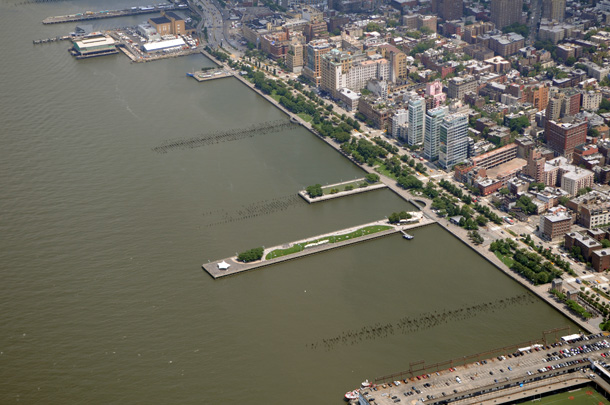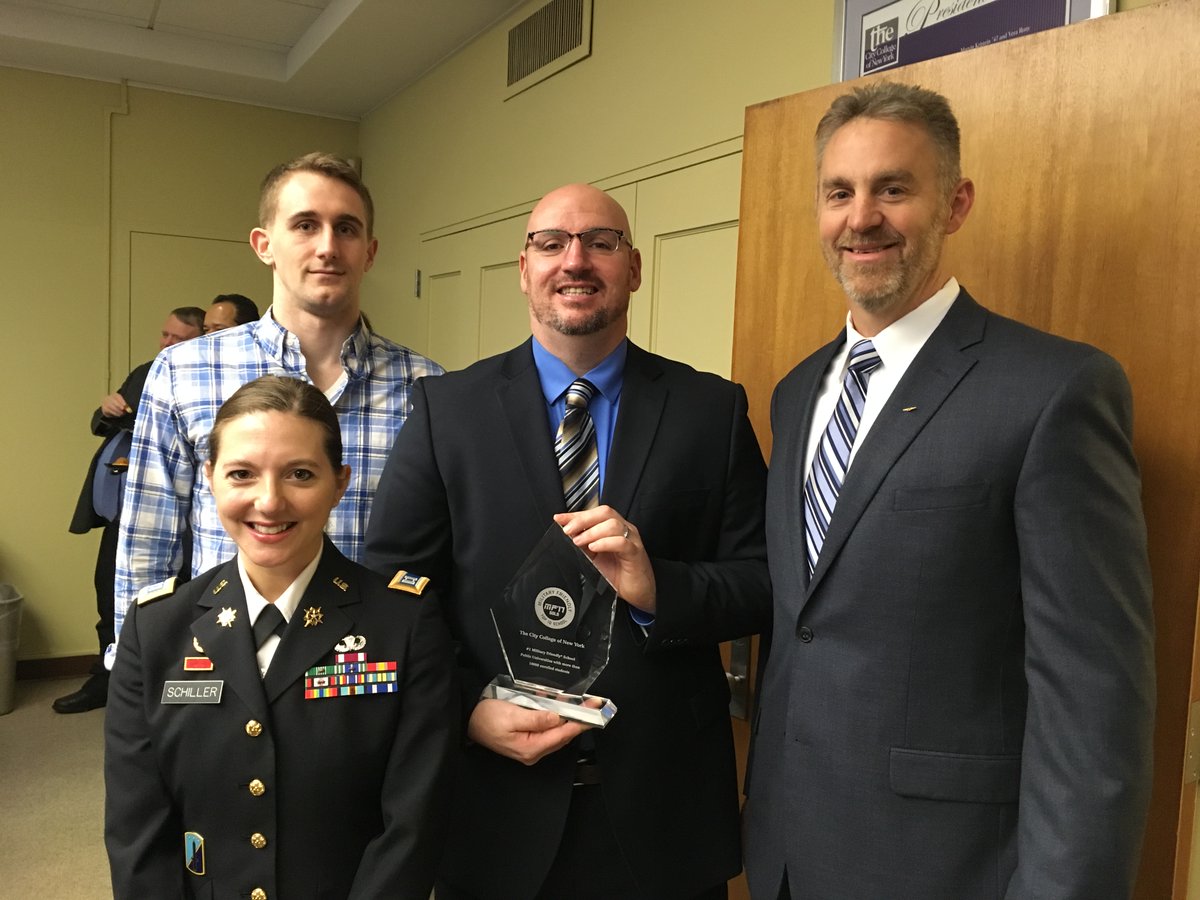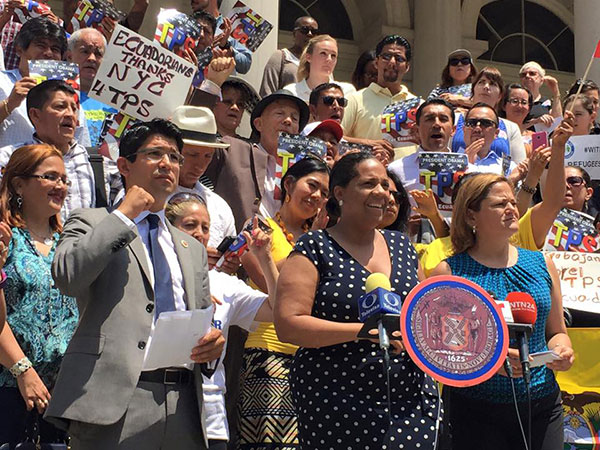Building in the Wrong Places: A Pivotal Choice

photo: Hudson River Park Trust
Building sites for so-called "parks" or other misplaced uses in or over the water offshore is a ruinous policy. Unprecedented proposals now before the City Council to help finance such in-water construction by selling legally dubious "air rights" (supposedly unused development rights) from sites in the lower Hudson River--starting with Pier 40--or other public waterways to mega-developers would magnify this harmful policy's potentially catastrophic citywide impacts.
Joanne Witty's Dec. 2 op-ed contained misrepresentations used by both the Hudson River Park Trust (HRPT) and the Brooklyn Bridge Park Corporation to market the in-water parts of these public authorities' projects. In both cases, the green space on dry land under their purview is genuine parkland. But the real estate these authorities plan to keep rebuilding in the water in the guise of a park is not.
The public waterway in the lower Hudson River--the natural resource now under the gravest immediate threat--is not a "park.” The River's priceless nearshore waters are the worst possible place to build or rebuild real estate for any non-water-dependent use. The 490 acres of open waters and piers and other structures under HRPT's jurisdiction are in a #1 (highest risk) hurricane evacuation zone, so building sites to attract more people to the river at that location puts too many people in harm's way in deadly storms. These waters are also an irreplaceable aquatic habitat for living marine resources, including valuable coastal fisheries. And the river's open waters are a treasured public open space resource for many thousands of New Yorkers.
Some good reporting on the risks to human life and property from building real estate offshore followed right after Superstorm Sandy, but since then too many investigative reporters have been asleep at the switch. The staggering risks to public safety from Hudson River development are matched only by the risks to city finances and to sensible public spending priorities, since under disastrous 2013 state legislation city and state taxpayers would be on the hook for storm and hurricane damage costs and liability claims and disaster recovery costs -- potentially billions of dollars worth, based on Superstorm Sandy.
Stealth 2013 amendments to the Hudson River Park Act approved when now-convicted State Assembly Speaker Sheldon Silver and Senate Majority Leader Dean Skelos were still in office shifted massive financial risks to taxpayers. This appalling package of 2013 amendments also paved the way for this week's "air rights transfers from the Hudson River" City Council proposals (LU 0506-2016 and related actions).
None of the Council's large staff had made timely, accurate information about these complex proposals public before crucial Council subcommittee and committee actions Dec. 5, despite an outpouring of opposition from Sierra Club, Clean Air Campaign, Friends of the Earth, and other activists. If the full Council approves and signs off on unprecedented, legally dubious "air rights" transfers from public waterways on Dec. 15, high-risk, complex financing schemes are likely to follow.
For what purpose? To implement a budget-busting, legally dubious, environmentally destructive, astronomically expensive 1960s policy that would unleash totally avoidable risks on New Yorkers today—along with swarms of “air rights” poised to land on any neighborhood where politicians want to make a deal to misuse our air, water and land.
That policy (building and rebuilding in-water development sites offshore) should be firmly rejected by any City Council member who values public safety, disaster prevention, genuine sustainability and resiliency policies that work, and fairer, wiser city spending priorities.
***
Marcy Benstock is executive director of Clean Air Campaign and its Open Rivers Project. Clean Air Campaign shares the website www.WestwayThenandNow.org with other groups.
***
Have an op-ed idea or submission for Gotham Gazette? Email This email address is being protected from spambots. You need JavaScript enabled to view it.
Letter: CUNY is Committed to Educating Military Veterans

CUNY has earned praise as "military friendly" (photo via CUNY)
Dear Editor:
Regarding Joe Bello’s Dec. 7 op-ed, CUNY is deeply committed to making our University a first-choice destination for veterans. We proudly educate more than 3,000 student veterans, up more than 250 percent over the last eight years. We recruit veterans; deploy dedicated admissions counselors who smooth their way through admission; waive their application fees; assure that New Yorkers eligible for the Post 9/11 GI Bill attend 100 percent cost-free, and offer in-state tuition to non-New Yorkers for their first 18 months of study. We also proactively review veterans’ Joint Service Transcripts to grant academic credit for military service. Our campus veterans’ services coordinators are a one-stop resource to support veterans in their transition from military life to higher education.
Earlier this year the City University of New York became the first university system in America to be named “military friendly” in recognition of its programs for veterans, members of the armed forces leaving the service, and their military spouses. City College was just named the nation’s number one military-friendly large public college. We are proud of these designations for CUNY and City College, which affirm our progress toward cultivating and sustaining a university that embraces and empowers student veterans.
External rankings validate the welcoming environment at CUNY colleges for those who have served their country. That said, more funding for veterans’ programs would certainly be most welcome, and we look forward to working with the City Council for additional support. In the meantime, CUNY colleges will continue to make the best of available resources to assist student-veterans wherever possible.
Sincerely,
Christopher Rosa
Interim Vice Chancellor for Student Affairs
City University of New York
***
Have an op-ed idea or submission for Gotham Gazette? Email This email address is being protected from spambots. You need JavaScript enabled to view it.
New York: A Sanctuary City with A Plan

The authors: Council Members Menchaca, left, & Ferreras-Copeland, center
New York’s immigrant families are waking up terrified as President-elect Trump, his supporters and growing administration spew hate. In spite of his new stance to “work something out” for Dreamers, Trump’s words are met with lack of trust. As the children of immigrants, we take attacks from Trump and his supporters personally and are filled with the courage needed to fight harder and smarter than ever to protect the rights and freedoms of diverse immigrant communities throughout New York City.
To this end, the New York City Council passed a resolution this week affirming our commitment to remain a sanctuary city for immigrants, and we personally delivered it hours later to Trump Tower. Our resolution codifies past commitments to sanctuary while signaling to everyone that we will invest the time, energy, and resources required to make good on our promises.
Our resolve is clear: we are here to stay.
Our City Council, like those in municipalities across the country, will play a lead role in this fight by redoubling our efforts to keep New York City a true sanctuary city. With the support of our Council colleagues, Speaker Melissa Mark-Viverito, Mayor Bill de Blasio, fierce advocates, and brave New York families, we commit to immigrants that this city will remain a safe home.
This week’s sanctuary city resolution memorialized our commitment, and we will ensure it through, in part, the following:
First, we will defend our victories by preserving existing policies, initiatives, and programs that protect immigrants.
Detainer Law: The Council’s 2014 detainer discretion law has protected between 3,000 and 4,000 New Yorkers per year from deportation. The law draws a bright line between municipal law enforcement and overly aggressive federal immigration enforcement. All New Yorkers are safer when there is trust between immigrants and the NYPD because crimes are more likely to be reported and witnesses feel safer. Under the Trump Administration, we commit to gear up for legal challenges to this law, and we expect to prevail.
The New York Immigrant Family Unity Program (NYIFUP): NYIFUP provides legal services for New Yorkers who are detained and facing deportation. It has been highly successful and serves as a blueprint for other progressive municipalities. Continued funding for NYIFUP is not guaranteed by the city. The de Blasio administration must increase NYIFUP funding and make it permanent.
CUNY Citizenship Now!: Since 1996, the City University of New York lawyers, paralegals, and volunteers have assisted hundreds of thousands of immigrants with legal advice, representation, and referrals. Programs like this are worthy of celebration and require our continuing support.
IDNYC: IDNYC is the largest municipal ID program in the country with over 900,000 subscribers. It promotes civic participation, the economy, and public safety. We will ensure it continues to thrive. We call on the de Blasio administration to do everything in its power to protect the personal data of IDNYC cardholders. Entities like the NYPD, banks, and cultural institutions must continue to honor this government-issued ID. We will do our part in the Council, and in conversations with the mayor, to protect and defend the privacy of current and future IDNYC cardholders.
Second, we must expand protections and investment for New York City immigrants.
We are committed to building upon our victories, expanding existing initiatives, and creating new services, through efforts such as:
Expanding Funding for Immigration Legal Services: Today, NYIFUP is limited to individuals who are detained and do not have a prior order of removal. In anticipation of the Trump administration, the program should be expanded to provide representation to other classes of immigrants facing deportation. The City Council and the de Blasio administration have also recently invested in legal representation in complex immigration cases. The demand for this type of representation will likely expand under a Trump presidency, requiring increased funding for these services, as well. We commit to fighting for these increases in funding for immigration legal services in the fiscal year 2018 budget negotiation process.
Right to Immigration Counsel Law: A right to immigration counsel enshrined in law would help ensure that all individuals going through immigration court proceedings are represented by competent lawyers. While this might be expensive, we cannot let that deter us from doing what is right. We commit to working with our colleagues in the Council and the mayor to further assess the feasibility of a Right to Immigration Counsel Law.
Protection from Notario and Immigration Attorney Fraud: One of the clearest ways to protect immigrant families is to ensure they are not victimized by unethical “notarios” (notaries who present themselves as immigration legal service providers) and incompetent or sham attorneys. Notario and attorney fraud harms vulnerable New Yorkers seeking immigration assistance. Our constituents encounter fake lawyers, scams, inflated fees, and predatory providers daily. Often, in addition to bilking families out of thousands of dollars, these bad actors cause serious harm to their legitimate immigration cases. We commit to working with the Department of Consumer Affairs, the Mayor’s Office of Immigrant Affairs, and advocates on continuing to protect immigrants from notario and immigration attorney fraud.
Expanding Participatory Budgeting: Each year, through Participatory Budgeting (PB), Council members voluntarily cede capital budget allocation decisions to residents of their districts who collaborate to decide which projects best serve their communities. We have repeatedly seen an overwhelming number of PB ballots in languages other than English, which demonstrates the engagement of immigrants in this process. This also indicates to us that while many immigrants cannot vote in other types of elections due to their immigration status, many are eager to participate in our city’s democratic process. The city all immigrants and other residents love, contribute to, and call home should welcome civic participation. We commit to strengthening PB in our districts and supporting its growth across the city.
We are prepared for a Trump era during which immigrant communities will likely be under attack. New York City will stand as a beacon of welcome, hope, and protection for immigrants.
In the New York City Council, we commit to defending our history of hard-won victories, while also expanding protections for immigrants. We know cities will need to hold the line against Trump administration attacks. As New Yorkers, we embrace that challenge together.
***
Carlos Menchaca is the City Council Member for District 38 in Brooklyn and Chair of the Committee on Immigration.
Julissa Ferreras-Copeland is the City Council Member for District 21 in Queens and Chair of the Committee on Finance.
Follow them on Twitter: @cmenchaca & @julissaferreras.
***
Have an op-ed idea or submission for Gotham Gazette? Email This email address is being protected from spambots. You need JavaScript enabled to view it.




